The Bill Knight Barton Fink Project

Here we ponder, and attempt to unravel, the most perplexing cinematic question since “What was the significance of Rosebud?”: “What the hell is Barton Fink about?”
Sometime in the days of the video store, we had a particular customer named Bill Knight who was generally pretty open to our suggestions. He was an older man with a very nice family and was one example of why we loved that job. One day, upon our suggestion, he rented the Coen Brothers’ BARTON FINK. Upon returning it, he said that he enjoyed it, but had one question: “What was that movie about?”
Honestly, we were stumped. We’d all seen it several times, but we weren’t quite sure how to describe it. Sure, we all know the basic surface story, but there’s a lot more going on there. So as a project, we all decided to put forth our own theories, and came to a specific conclusion: The movie is about heads.
Here are those articles:
THEORY #1:
“Artificial Hell”
by Chad
NOTE: This is a seat-of-my-pants, on-the-spot analysis of BARTON FINK by Joel and Ethan Coen. This is written without seeing the film in several months, without any careful examination. I’m not even sure if I believe all I’ve written; it’s just one angle, one way of looking at it.
In a sentence, BARTON FINK is about the pretentious and secluded world in which the artist lives. All of the things that drive Barton crazy are trivial compared to the problems of real life. Barton has no vision of reality, of real people, a fact that is exemplified in his inability to enjoy or write a picture about wrestling. He may know Tolstoy or Chekov or Kafka, but he doesn’t know what a piledriver is. Nor is he really willing to learn. He finds the wrestling script project degrading, below him. He is an elitist, a snob, and he shares his elitist view of many that the stage is more artistic than the screen.
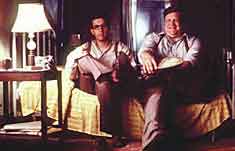 What drives Barton Fink mad? Besides the wrestling project mentioned above, it is the trivial that gets to Barton. The annoying bellboy, who is only there to help. The peeling of wallpaper, a slight annoyance to his artistic concentration. The destruction of the image of one of his heroes as an artist (has this character, played by John Mahoney, ever really done anything worth idolizing?) The constant visits by John Goodman’s character, who is nothing but nice and friendly, if just a little overbearing. What bothers Barton, I am convinced, is not this man’s behavior, but who he is. He is a working class man, a slaesman, someone below Barton’s artistic mentality. And finally, there is his writer’s block, the worst thing that can happen to an artist: a halt in creative flow. It is even conceivable that the rest of Barton’s distractions are merely mental constructs, physical manifestations of his writer’s block. But that’s a whole other train of thought. So Barton is locked in his own little world (his hotel room), which comes apart (literally, as far as the wallpaper is concerned) at the seams. Barton believes he is in some sort of hell (he certainly looks and acts as such). But what is hell? Barton is certainly not in Bosnia, on the lookout for landmines. Nor is he in a rebellious Central American country, wading in a pool of childrens’ blood. No, he has writer’s block. Boo-hoo. Barton’s hell is relative, and, in comparison to reality, petty and trivial.
What drives Barton Fink mad? Besides the wrestling project mentioned above, it is the trivial that gets to Barton. The annoying bellboy, who is only there to help. The peeling of wallpaper, a slight annoyance to his artistic concentration. The destruction of the image of one of his heroes as an artist (has this character, played by John Mahoney, ever really done anything worth idolizing?) The constant visits by John Goodman’s character, who is nothing but nice and friendly, if just a little overbearing. What bothers Barton, I am convinced, is not this man’s behavior, but who he is. He is a working class man, a slaesman, someone below Barton’s artistic mentality. And finally, there is his writer’s block, the worst thing that can happen to an artist: a halt in creative flow. It is even conceivable that the rest of Barton’s distractions are merely mental constructs, physical manifestations of his writer’s block. But that’s a whole other train of thought. So Barton is locked in his own little world (his hotel room), which comes apart (literally, as far as the wallpaper is concerned) at the seams. Barton believes he is in some sort of hell (he certainly looks and acts as such). But what is hell? Barton is certainly not in Bosnia, on the lookout for landmines. Nor is he in a rebellious Central American country, wading in a pool of childrens’ blood. No, he has writer’s block. Boo-hoo. Barton’s hell is relative, and, in comparison to reality, petty and trivial.
Of course Barton’s mental hell becomes quite insignificant when compared to the hell he witnesses during the film’s final sequence. The slightly annoying salesman becomes a serial killer, the hotel of his torment becomes an inferno, flames and all, and the world that is beneath the artist comes crashing down on top of him. this is real hell.
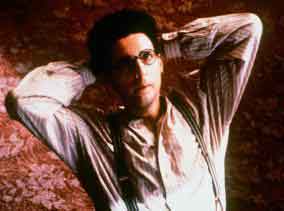 So what is this all saying? I believe that the Coens are making a comment on the artist and the somewhat naive world in which he lives. i do not believe that the film is an overall condemnation of artists, for they are a needed aspect of society, but maybe a warning, and indictment of the latte-drinking poet-wannabees who think that Nietzche and Warhol are all that matters and that everyone else is beneath them. I think that the Coens see this aspect in themselves (the original idea was conceived when the brothers suffered a bad case of writers’ block while working on their gangster picture MILLER’S CROSSING. They are not-very-commercially successful arthouse faves. The critic loves ’em, the common man has never heard of ’em. Maybe that’s what Barton Fink is: Beware the power of the common man, the kind that enjoys Stallone movies and wrestling pictures, you high-minded artist wannabes. You are no better than them, just different. It is unfortunate that the majority of people who enjoy this film are just that. They sympathise with Barton, and suffer through his hell. They probably both deserve it.
So what is this all saying? I believe that the Coens are making a comment on the artist and the somewhat naive world in which he lives. i do not believe that the film is an overall condemnation of artists, for they are a needed aspect of society, but maybe a warning, and indictment of the latte-drinking poet-wannabees who think that Nietzche and Warhol are all that matters and that everyone else is beneath them. I think that the Coens see this aspect in themselves (the original idea was conceived when the brothers suffered a bad case of writers’ block while working on their gangster picture MILLER’S CROSSING. They are not-very-commercially successful arthouse faves. The critic loves ’em, the common man has never heard of ’em. Maybe that’s what Barton Fink is: Beware the power of the common man, the kind that enjoys Stallone movies and wrestling pictures, you high-minded artist wannabes. You are no better than them, just different. It is unfortunate that the majority of people who enjoy this film are just that. They sympathise with Barton, and suffer through his hell. They probably both deserve it.
THEORY #2:
“Reflections”
By Bobby
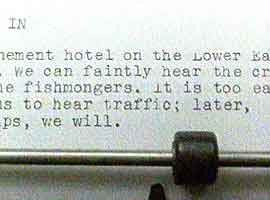 These are three different articles by three different people. The comparison seems amazing at first but when you really get down to it, these aspects of Barton Fink are quite obvious. Perhaps the quirky little things in the film, like the ever-peeling wallpaper and the beach photo simply throw us off from the real intent of this film. When I first saw this film I was determined to find some deep, metaphorical meaning to the peeling wallpaper. Now I’m not so sure. The most obvious observations are generally the best, and like Chad wrote, maybe the wallpaper is there simply to represent Barton’s “coming apart at the seams.” My point is just that. The answers are usually right there on the surface. The Coens’ movies have odd people and weird events that only serve to mask a very simple story usually involving a relationship between the body and the spirit; The logical aspect of a person (HEAD) and the emotional aspect (HEART). Using this interpretation for the Coens’ films is very simple and very complex at the same time.
These are three different articles by three different people. The comparison seems amazing at first but when you really get down to it, these aspects of Barton Fink are quite obvious. Perhaps the quirky little things in the film, like the ever-peeling wallpaper and the beach photo simply throw us off from the real intent of this film. When I first saw this film I was determined to find some deep, metaphorical meaning to the peeling wallpaper. Now I’m not so sure. The most obvious observations are generally the best, and like Chad wrote, maybe the wallpaper is there simply to represent Barton’s “coming apart at the seams.” My point is just that. The answers are usually right there on the surface. The Coens’ movies have odd people and weird events that only serve to mask a very simple story usually involving a relationship between the body and the spirit; The logical aspect of a person (HEAD) and the emotional aspect (HEART). Using this interpretation for the Coens’ films is very simple and very complex at the same time.
There are, however, two aspects of Chad’s interpretation that really don’t gel with my opinions of the movie. My intent here is not to create a point of debate but to bring out a better understanding of the film by comparing the two views. Please note that I understand the fact that the theory Chad came up with is not necessarily his personal views, but one of many ways of looking at the film.
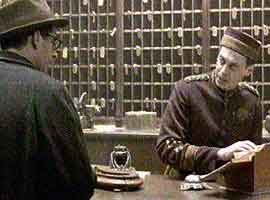 1. In his third paragraph, Chad writes that “Barton’s hell is relative, and, in comparison to reality, petty and trivial”. Now, I know that this is a longshot and maybe that’s the point. When something is relative then it can’t be compared to anything else. If Barton’s hell is relative and petty compared to reality then this reality is relative and just as petty depending on whose reality it is. Confusing, I know. But stop and think about it for a moment. Barton has his own reality. Everyone does. In that case, how can one reality be right and another be wrong? If you take the view that everything is relative then it is neither right nor wrong. It just is. Now, I don’t necessarily believe that this is the main theme that the Coens were trying to convey, but I do believe that every angle of thinking helps to understand the whole. Barton’s personal hell may seem petty at first but if it and everything else is indeed relative then his emotional problems are just as viable as, say, millions of starving children in Ethiopia.
1. In his third paragraph, Chad writes that “Barton’s hell is relative, and, in comparison to reality, petty and trivial”. Now, I know that this is a longshot and maybe that’s the point. When something is relative then it can’t be compared to anything else. If Barton’s hell is relative and petty compared to reality then this reality is relative and just as petty depending on whose reality it is. Confusing, I know. But stop and think about it for a moment. Barton has his own reality. Everyone does. In that case, how can one reality be right and another be wrong? If you take the view that everything is relative then it is neither right nor wrong. It just is. Now, I don’t necessarily believe that this is the main theme that the Coens were trying to convey, but I do believe that every angle of thinking helps to understand the whole. Barton’s personal hell may seem petty at first but if it and everything else is indeed relative then his emotional problems are just as viable as, say, millions of starving children in Ethiopia.
2. Chad’s theory of the intent of the artist. I don’t think that the Coens would make a movie just to make a point. It seems to me that if Barton Fink is simply a comment on the “atist” that all it would be doing is just that. Making a point, I believe that the core of the movie runs much deeper than this, perhaps even on a subconscious level. This theory would explain many of the bizarre characters and events that take place in their films…
THEORY #3:
“Cerebral”
By Noel
If there were any one word I would use to describe BARTON FINK, it would be “cerebral”. One thing that truly ties this film together with the viewer is the simultaneous use of the noodle. The noggin. The brain. The head. You have to be able to read Barton’s thoughts in order to feel the things that he does in this picture in order to truly enjoy it. Not that it’s necessary to sympathise with him, but it helps to be able to get inside the skull of Barton Fink.
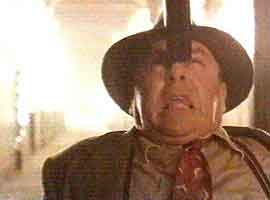 That out of the way, I’d like to add a bit of my own observation to the film and its meaning which has already been readily discussed here. We’ve talked about the snobbery of the artist, the way Barton feels he is in a personal hell even though what he is experiencing is trivial to the common man. The heat bothers him. The bellboy annoys him. The wallpaper distracts him. The salesman makes him nervous. But the interesting thing here is you have to put yourself in Barton’s shoes while watching this movie. I found his character to be pretentiously reprehensible, but at the same time I felt the same way he did about such nuances as the wallpaper. I didn’t WANT to sympathise with the character, but in a way I did. And you also have to realize that Barton Fink is working out of his element. He’s used to writing for the stage, and for a few dollars more he’s opted to lend his talents to Hollywood and write something with which he’s not experienced. So you can’t take the view that the film is totally in criticism of the artist.
That out of the way, I’d like to add a bit of my own observation to the film and its meaning which has already been readily discussed here. We’ve talked about the snobbery of the artist, the way Barton feels he is in a personal hell even though what he is experiencing is trivial to the common man. The heat bothers him. The bellboy annoys him. The wallpaper distracts him. The salesman makes him nervous. But the interesting thing here is you have to put yourself in Barton’s shoes while watching this movie. I found his character to be pretentiously reprehensible, but at the same time I felt the same way he did about such nuances as the wallpaper. I didn’t WANT to sympathise with the character, but in a way I did. And you also have to realize that Barton Fink is working out of his element. He’s used to writing for the stage, and for a few dollars more he’s opted to lend his talents to Hollywood and write something with which he’s not experienced. So you can’t take the view that the film is totally in criticism of the artist.
At the same time, the film makes you feel for the common man. John Goodman’s character is very convincing. We feel in touch with his everyman persona and understand how he’s truly had to work for what he has. We realize that without the Charlie Meadows of the world, there would be no place for the Barton Finks. The opposite, however, is not entirely true. But when the film draws to a finale, as we’ve begun to feel more sympathetic for the everyman character, the tables are turned and Barton turns out to be the good guy after all. Sure, he looks down his nose at the salesmen and hotel clerks of the world, but at least he’s not a serial killer.
Going back to the idea that the movie is about “Heads”, which is an astute observation but needs some weight to support it, we see that Barton Fink does indeed covet his own head. It’s his prized possession, and he can use it to deflect his shortcomings elsewhere. When the movie exec is worried that the picture won’t be completed by deadline, Barton simply points to his head and says it’s all there. And because of his status as an artist, he is able to get away with such. Whether or not he’s being honest is another story, but Barton’s reputation allows him to get away with it.
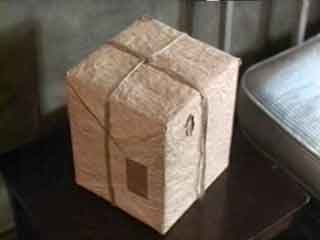 Another underlying aspect of this film that has not yet been touched upon is the idea of the muse. Shakespeare was often known for having a muse, a lovely woman who would be his inspiration for a project. Barton seeks his muse in a picture on the wall, but it doesn’t seem to be productive. Rather, it turns out to be distracting. It’s not until Charlie has to disappear for a few days and leaves Barton Fink a mysterious package that he is able to complete his wrestling movie. The box appears to be his muse. He doesn’t open it or put too much thought of what’s contained within, but it still seems to guide him in to finishing his project. Granted, it’s a safe bet that the box contains the head of Audrey Taylor, but we don’t know for sure. Neither does Barton, but I think he’s pretty sure of it. So at the end of the picture, we see Barton on the beach with both his intended muse and the ironic default muse content with himself, even after the horrible things that have happened to him. Perhaps Barton has reached an epiphany and realizes the role of the everyman, or perhaps not. It’s really irrelevant at this point.
Another underlying aspect of this film that has not yet been touched upon is the idea of the muse. Shakespeare was often known for having a muse, a lovely woman who would be his inspiration for a project. Barton seeks his muse in a picture on the wall, but it doesn’t seem to be productive. Rather, it turns out to be distracting. It’s not until Charlie has to disappear for a few days and leaves Barton Fink a mysterious package that he is able to complete his wrestling movie. The box appears to be his muse. He doesn’t open it or put too much thought of what’s contained within, but it still seems to guide him in to finishing his project. Granted, it’s a safe bet that the box contains the head of Audrey Taylor, but we don’t know for sure. Neither does Barton, but I think he’s pretty sure of it. So at the end of the picture, we see Barton on the beach with both his intended muse and the ironic default muse content with himself, even after the horrible things that have happened to him. Perhaps Barton has reached an epiphany and realizes the role of the everyman, or perhaps not. It’s really irrelevant at this point.
I do like the idea that Chad presented earlier, in that the film is a warning to the artist to beware of the common man. It really works without glamourizing or downplaying any of the roles involved. But I still think that the movie is about heads.
The MCFTR Critical Circle’s conclusion:
The movie is about heads.

 subscribe to rss
subscribe to rss 




















I just watched this movie for a film class I am taking. Your descriptions were extremely helpful. I know this is nearly 12 years after you wrote the analysis but thank you!!!
It’s 5:03 AM, and I just got done watching Barton Fink. I wasn’t even going to watch a movie tonight, but went out to have doughnuts from a 24-hr doughnut place nearby with a friend and decided to eat the sweets over a movie back home. It’s my friend who suggested we watch this movie, saying it’s a comedy from the early 90’s. I obliged. Midway through the movie, before any of the killings, my friend said it was too slow for him and that he couldn’t bear to watch any more of it. We watched some tv and soon after, my friend left. I then continued the movie and finished it. I really couldn’t make much of it. And now I’m searching all over the internet as to what the movie signified. I’m glad for all you creative thinkers; the makers of the Barton Fink that make the world more glamorous! I, too, would love to portray my views in such a literary manner or art. Thanks for the movie, and thanks for you guys’ comments.
Leave your response!
Follow us on your favorite Social Network:
Link to us!
Site Friends:
The Belligerent Monkey
Wrestling With Pop Culture
Third Half Studios
Earth Station One
Mentally Incontinent
The Sci-Fi Movie Page
IMSDB
Monthly Archives
Categories
Tags